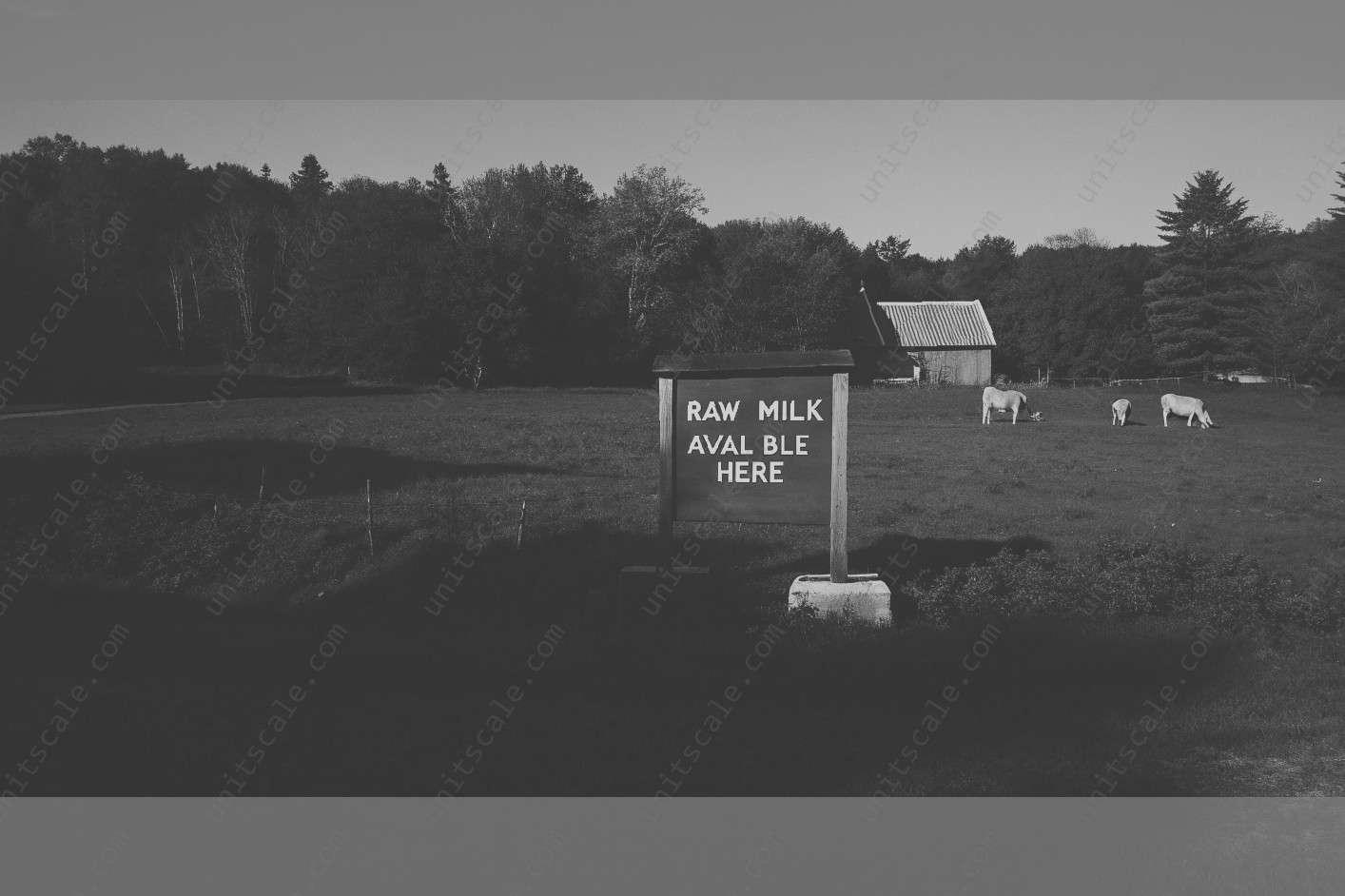Massachusetts Statutes on Raw Milk
Currently, Massachusetts law does not prohibit the sale of raw milk for human consumption. Massachusetts General Laws Ch. 94, § 8 allows for the purchase of raw milk directly from the farm where it is produced. Under M.G.L. c. 94 § 169, it is legal to sell, use, or offer or expose for sale or transportation, "unpasteurized milk or milk products originating on the premises where the milk is produced". In other words, there is no state ban on raw milk sales in Massachusetts. The only time raw milk may be sold to a consumer is if the consumer goes directly to the farm where the milk is produced to buy it and the producer meets certain state requirements. In addition to the misdemeanor penalty in M.G.L. c. 94 § 300, the sale of non-compliant raw milk may also result in a civil penalty of $2 , 500 per offense.
As a result of a provision in M.G.L. c. 94 § 161, the Massachusetts Department of Agricultural Resources (MDAR) lifted the state’s ban on the sale of raw milk at farmers markets in April 2014. MDAR published regulations on the sale of raw milk at on-farm stores and off-property events in May 2015. MDAR’s regulations are set forth in 105 Code of Massachusetts Regulations (CMR) § 590 and incorporate the federal regulations set forth by the United States Food and Drug Administration (FDA). To re-emphasize, however, the regulations do not included any requirements for the sale of raw milk at farmers markets, under which Massachusetts farmers continue to sell raw milk in compliance with the general raw milk statutes outlined above.
Legally Purchasing Raw Milk
The recent interest in raw milk is somewhat surprising in light of the well-publicized public health risks associated with its consumption. The USDA has reported 144 outbreaks of foodborne illness associated with raw milk between 1998 and 2008. FDA and CDC do not currently recognize any health benefits from consuming unpasteurized milk. Citing these serious risks, Massachusetts law prohibits the sale of raw milk, directly or indirectly, for human consumption.
But followers of this blog know that there are exceptions to every rule. Massachusetts law does permit "Class A" farms – those licensed by the state under G.L. c. 94C – to sell raw milk directly to consumers under certain conditions.
To clarify: Under G.L. c. 94C, a "class A" license authorizes the licensee to grow or produce agricultural or horticultural commodities and to process, package, distribute, market, and sell any processed agriculture or horticultural products, including honey, syrups, wines, oils, pickles, bottled waters, and beverages. Class A farmers, however, must have a commitment to the production of organic crops and/or animals and use only organic food or feed and non-synthetic materials for soil amendments and pest and weed control. So when you see the term "Class A" on a Massachusetts farm’s website, it is a good bet that farm is organic in nature and wants to make it known.
Class A farms may sell raw milk directly to consumers in on-site retail stores, at farmers’ markets and to brokers and retailers as long as the farmer remains on the premises. Dairy cows and goats must be pastured and graze while not in the milking parlor or milking stall and hay, fodder and silage may not come from off the farm unless certified organic. Under no circumstances may raw milk be sold wholesale.
Raw milk sales to consumers are also allowed if they are part of a cow-share or goat-share program, but you will need to enter into a contract with the farmer, which will then allow you to become a "shareholder" in the herd and the farmer will award you a specified portion of the herd’s milk. The legalities of raw milk sales are so complicated that you should consult an expert in Massachusetts agricultural law before entering into any agreement.
Health Pros and Cons of Raw Milk
Dr. Bernice Wu, M.S., a Seattle veterinarian, provides a good overview of the health benefits, and risks, of raw milk: "Raw milk has all the nutrients typically found in milk: protein, calcium, fats, vitamins A, B complex, D and K, and minerals such as magnesium and phosphorus." Dr. Wu claims that research shows an increase in the resistance to infections in children and that they tend to be healthier. Raw milk is easier for some people to digest and absorbs more nutrients. She goes on to claim that supplements from grains, soy and corn result in less "nutritional value." Dr. Wu acknowledges that pasteurization kills good bacteria, but states that is the reason it is "important to balance raw milk consumption with the use of probiotics regularly." She finishes with this caveat: "There are a lot of farmers who go beyond the standards in those certifications by providing higher quality milk." But she warns that there are several problems with raw milk: pasteurization kills marginally pathogenic bacteria, potentially damaged and diseased animals are not handled by farmers with pure herds, and many foodborne microorganisms are resistant to antibiotics, however, some that would normally be eliminated can survive in raw milk for months: "Among other bacteria, Campylobacter jejuni is one of the most commonly isolated from victims of gastrointestinal disease following consumption of unpasteurized milk. A herd which is C. jejuni-positive can shed this pathogen for months, and it has been isolated from feces, milk, raw cheese, and on-farm raw milk pasteurizers, and in the environment of the dairy farm…. Toxins secreted by E. coli O157:H7 cause sickness in humans and can kill by damaging the vascular system, particularly in young kids and immunocompromised adults. Listeria monocytogenes is another bacterium growing in popularity as a cause of milkborne, processed milk, and cheese outbreaks. Infected adults may be asymptomatic, but the disease can be fatal when it spreads from the mother to the fetus through the placenta or when she was born (it is possible for the newborn to be infected). Pregnant women are at the highest risk of being infected, leading to such complications as spontaneous abortion, stillbirth, premature delivery, and sick newborn infants.
Regulatory Entities and Raw Milk Safety
Regulatory bodies in the Commonwealth of Massachusetts, such as the Department of Public Health (DPH), have their own set of standards for raw milk safety. These rules are adopted and considered the minimum standards by those states that permit the sale of raw milk at the farm or elsewhere. The DPH rules are frequently updated to reflect emerging knowledge or technology in the food industry. Such updates ensure the continuous improvement of health and safety regulatory standards. In Massachusetts, the DPH drafts new regulations and proposes changes to the existing regulations through the Regulatory Impact Statement process, which must first be approved by the Governor’s Office (The last time this was done for raw milk was in 2011).
These regulations set the maximum allowable bacterial counts and somatic cell levels in raw smooth milk (i.e. raw milk that has not been separated or recombined, or pasteurized) . At a maximum, raw milk has to pass the following tests: States that allow the sale of raw milk on the farm or retail as a dairy farm product marketed directly to the consumer also inspect those facilities and maintain a rating system with scores ranging from "Excellent" to "Unsatisfactory" or "Unsatisfactory-Intended". Reports include the name and address of the dairy facility, status, org, rating, grade, water testing results, and other information. In Massachusetts, however, there is no Department of Public Health website that lists the inspection reports or rates producers who sell raw milk on and off the farm. The most recent available report on raw milk safety in the Commonwealth was drafted in 2017. However, in a telephone conversation with a dairy farmer, we were told by the DPH Dairy Inspector in late 2022 that the ratings for raw milk operations are forthcoming.
A Comparison of the Law of Raw Milk Between States
In many ways, the Massachusetts raw milk laws are similar to those of other neighboring New England states. In most states in New England, as well as many other places, selling raw milk is legal only on a farmer’s own property and not through stores or other retail locations. Retail sales are typically the exception rather than the rule. Most state laws allow on farm sales and prohibit retail sales.
Many states, like the Bay State, specifically require raw milk to be kept at 45 degrees or colder. Some states are even more stringent, permitting temps of 40 or 42 degrees, but only requiring 45 degrees.
As you would expect, regulations on raw milk differ from state to state. While Massachusetts law requires a producer to hold a license to sell raw milk, not all states do.
According to a website called the Farm-to-Consumer Legal Defense Fund, 27 states allow the sale of raw milk. Twelve states permit the sale of raw milk only through on farm sales, nine states allow sales at farmers markets, eight states permit sales through cow-share programs, and one state allows a small herd exemption.
The Massachusetts law requiring a Pewlsip septic system on the farm site to hold a license to sell raw milk is an example of one state’s stricter requirements.
In New York, producers must have a permit from the Department of Agriculture and Markets to sell raw milk. No wholesale sale is permitted and delivery of raw milk is prohibited in New York state.
New Jersey does not permit any sale of raw milk.
Pennsylvania, on the other hand, is known for its raw milk. It is one of the few states with a registered raw milk herd-share farm. Cow-sharing programs allow for the joint ownership by several families of a cow, which provides them with all the milk produced by that animal.
All raw milk is illegal in Connecticut. Vermont and New Hampshire both have some type of raw milk herd-share program.
Rhode Island and Maine do not permit the sale of raw milk.
Public and Consumer Sentiment
Public opinion on raw milk within Massachusetts has a strong consumer advocacy presence, inwardly focused on consumer choice and educational efforts to provide information on the relative safety of raw milk. The Massachusetts Farm Bureau (MFB) advocates the sale of raw milk in the state and led the recent charge for draft legislation to expand the ability of farmers to sell raw milk directly to consumers. One of the main goals of the proposed law was to ensure affordability and accessibility of raw milk, however its sponsor recently withdrew the bill in the face of opposition from the Massachusetts Department of Agricultural Resources (MDAR) and the Massachusetts Public Health Association, precipitated by opposition from the Massachusetts Medical Society. In the interim, public interest groups have been promoting petitions to support the sale of raw milk on the MDAR homepage. These groups have spearheaded campaigns to advocate for raw milk and support agriculture by making raw milk and other products more available for purchase at local farms . Advocates include the Weston A. Price Foundation, a consumer health advocacy group that promotes farming, food and food labelling policies consistent with its ideals. As proponents of more consumer choice in the raw milk arena, consumer groups have undertaken advertisements, social media campaigns and blogs to spread the word on the relative benefits of raw milk, and their position that the government should not interfere with the right of farmers and consumers to engage in this relationship. They point to the actions of other New England states that have already legalized the sale of raw milk, while calling attention to the lack of an identifiable increase in the rate of associated illness. On the other side of the issue is the option to pasteurize. The Weston Price Foundation states that pasteurization has allowed big agribusiness to consolidate power, and that raw milk is an antidote to the dangers of the industrial food supply. Its view of pasteurization is that it creates unhealthy and unbalanced digested products and proteins that are difficult to absorb.



